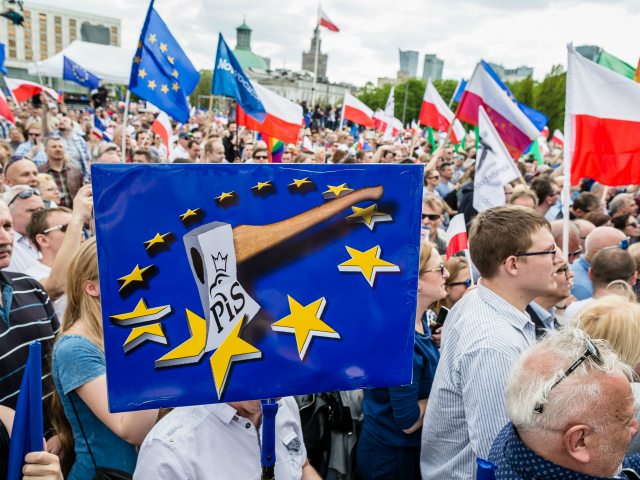In a further boost to the European Union (EU) referendum ‘Leave’ campaign, Great Britain’s key European ally, Poland, has not only been turning decisively Eurosceptic but has also found legal grounds to ban the EU flag.
There have of course been the widely reported and exaggerated developments – such as Poland sending shockwaves through the Europhile parts of the EU by removing the Union’s flags from the Polish Prime Minister’s conference room last November.
That move may have been merely symbolic, but it served as a gentle reminder to Europe of a change of guard in Warsaw by Andrzej Duda, the Euro-realist Polish President since May 2015. His appointment was soon followed by his Law and Justice (Prawo i Sprawiedliwość, PiS) party forming Polish government last October with a decisive victory.
In March 2016 Poland at last introduced a scientific element to its EU debate. The formal cross-party Parliamentary Euro-realist Group (Parlamentarny Zespół Eurorealistyczny) was mandated to evaluate the Polish-EU relationship via actual cost-benefit analysis, as well as investigating the political and legal implications of Poland’s relationship with the European Union.
Congress of the New Right (Kongres Nowej Prawicy) – whose four MEPs entered the European Parliament in 2014 with a programme of reduction of EU prerogatives – has an MP in the Polish Parliament in Jacek Wilk, party chairman, who now channels these proposals via the Euro-realist Group.
He mentions that Lisbon Treaty allows for EU members’ exit, whilst guaranteeing a right to free trade, and references EEA and EFTA as the preferred options. Mr. Wilk points out that the current cross-continent standardisation drive, coupled with increasing socialism, are intentional moves that suit the strategy of EU’s undisputed leader, Germany. He considers the hopes of fixing the sclerotic EU bloc futile.
Tomasz Rzymkowski, chairman of the Euro-realist Group and a Kukiz’15 / Ruch Narodowy (National Movement) parliamentarian stresses that opening up a debate is a must, given that until recently Poles have been subjected to one of the most intense Europhile propagandas on the continent via the largely German-owned media. He believes that by joining the EU, and hence allowing the more advanced Western economies to freely compete with Poland, the country may have forsaken its chances of development and instead solidified the position of a European low-cost periphery.
The group also aims to investigate the distortions to the Polish economy created by “EU grants” (i.e. largely Polish money circulated back to Poland via Brussels), as well as the indebtedness of local governments resulting from EU-facilitated financing of white elephant projects, such as underused airports.
Like many other euro-sceptics, euro-realists or increasingly even those concerned with preserving the EU, Tomasz Rzymkowski admits that the Union should be scaled back to its European Economic Area (EEA) foundations, where it purely acts a guarantor and facilitator of the four freedoms of movement (i.e. people, goods, services, and capital). Completely understanding of the members’ wish to exit and given the United Kingdom is recognised as Poland’s key ally, he confirms a serious commitment to cooperation in the event of a Brexit.
Robert Winnicki, a National Movement parliamentarian and party chairman, is another prominent member of the Parliamentary Euro-realist Group. As much as he has some hope for reforming the EU, he believes that in its current shape, and in case of insufficient decentralising reforms, it would be in Poland’s interest to leave.
The recently resurgent Visegrad Group alliance of Poland, Slovakia, the Czech Republic, and Hungary with a possible addition of Belarus could provide a future international cooperation option if the right economic, political and defence-related bilateral agreements were secured. The idea is reminiscent of Piłsudski’s Intermarium (Międzymorze), albeit in a more realistic and minimalist form.
The Euro-realist Group is further tasked with assessing the compatibility of Poland’s EU accession treaty with the Polish constitution and investigating all the subsequent legislative additions the European Union has rolled out that impact on the Union’s relationship with Poland and the Polish law, inclusive of the Lisbon Treaty in particular.
Needless to say, the group consists of some foremost legal experts such as Professor Krystyna Pawłowicz, a PiS parliamentarian and one of the more prominent voices of opposition to the EU within her party, who as a former Constitutional Tribunal judge argues that Poland’s participation in the European Union in the present situation, whereby the EU law supersedes Polish law, directly contravenes Polish constitution.
Prof. Pawłowicz points out that the presence of the EU flag in Poland is illegal and that the EU tends towards a complete centralisation, which is at odds with the national interests of member states, including those of Poland. Her clear Euroscepticism sounds very natural to our British readers, especially with Euro-sceptics going officially mainstream last summer with the announcement of the Brexit referendum and Tory politicians coming out in their droves in support, but as the Eastern EU major parties are concerned Prof. Pawłowicz’s is just one of the few voices fully critical of the failed EU concept.
Her clear Euroscepticism sounds very natural to British readers, especially with Euro-sceptics going officially mainstream last summer with the announcement of the Brexit referendum. But as the Eastern EU major parties are concerned Prof. Pawłowicz’s is just one of the few voices fully critical of the failed EU concept.
For the generations of Poles resident in the United Kingdom, Euroscepticism comes quite naturally. Just recently there used to be a Friends of Poland in UKIP club affiliated with the Eurosceptic party; the Polish Conservatives outfit also boasts a considerable Eurosceptic representation and there now is a Poles for Britain campaign.
It is therefore a very welcome development that Poles in Poland have come of EU age and we now observe some clear opposition to the European Union.
As such, although a Polexit referendum seems to be some way off, the debate around the real merits of the EU has at last been kicked off and participation of PiS parliamentarians ensures no empty accusations of furthering Russia’s interests can be thrown about by the Eurocentric camp.





COMMENTS
Please let us know if you're having issues with commenting.